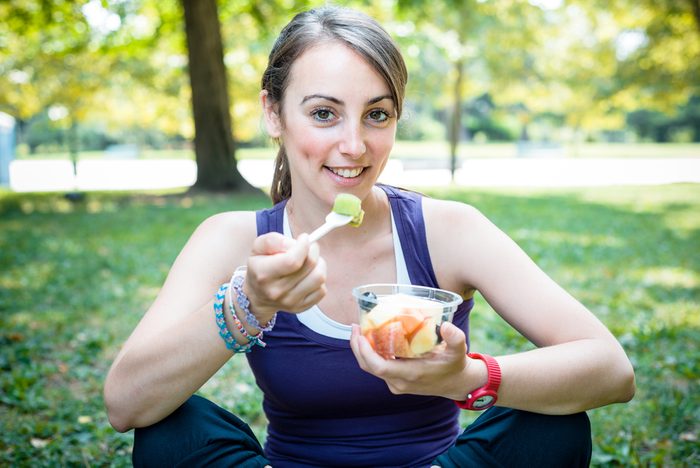
1. Go for a walk
Researchers have long touted the physical benefits of walking, such as increased oxygen intake, revved-up circulation, a healthier heart and calorie burning. But walking can also shed stress and enhance calm energy, making it the perfect way to practice self-care.
“Mindful walking means that you’re living in the moment,” says Laura Farres, a Vancouver sport psychology consultant.
Want to give mindful walking a try?
“Think about every aspect of your foot movement: lifting the heel, the middle of your foot and then the toes,” says JoAnne Hunter, a nurse practitioner at Toronto Western Hospital. She teaches walking meditation, where participants walk very slowly, inhaling with one step and exhaling with the next. “This helps you think about your connection to the earth,” Hunter says. “You feel peaceful and in touch with your body, which reduces stress.”

2. Masturbate
If stress is starting to pile up, it might be smart to take a solo time-out. Masturbation allows you to focus on one thing, which can help you relax, says Judith Golden, a registered sex therapist in Toronto.
“As we think about sex in any form, dopamine, a chemical released by the brain that gives us a sense of pleasure, is released,” she explains. “As we engage in sexual activity, another chemical, endorphins, is released. Endorphins give us a sense of well-being.”
Just be careful not to rely on masturbation as an escape from stress, Golden adds, because it’s through that reliance that an addiction can form. But the occasional solo roll in the hay can help make a bad day a little (or a lot) better.

3. Eat a healthy snack
When people get really hungry, they choose more unhealthy foods, eat more quickly and eat too much. So, one of the best benefits of snacks is that they prevent you from getting to this point. Planning ahead and eating a healthy snack when you’re just starting to get hungry will prevent you from making unhealthy choices later. Nourish your body with healthy and delicious snacks like trail mix, veggies and hummus or grass fed jerky.

4. Try journaling
Journaling is one of the easiest ways to get the weight of the world off of your shoulders.
Dermatolgist Dr. Howard Murad, author of Conquering Cultural Stress: The Ultimate Guide to Anti-Aging and Happiness, finds the most effective type of journaling involves writing about your day and any of the thoughts that flow naturally through your mind.
“Self-care begins with self-discovery,” he says. “And committing your thoughts and ideas to paper can make a huge difference.” Consider it time that’s just for you. It’s a chance to sit calmly and forget the rest of the world for a few minutes.

5. Practice yoga
Self-care is the best way to combat stress, which has a very physical effect in the body “Stress activates our sympathetic nervous system, putting us into a fight or flight response,” says Nelson. “Many people these days are so stressed that they are chronically in fight or flight mode, which can lead to metabolic dysfunction, anxiety, depression and other chronic health problems.”
So how does yoga help? Lisa Nelson, a family physician, director of medical education at the Kripalu Center for Yoga and Health and co-author of Yoga and Diabetes, says that it activates the parasympathetic nervous system, also known as the rest and relax response. “The more we do yogic practices like asanas postures, meditation and slow breathing, the more relaxed we can become.”
Practice yoga without the high studio costs by watching some free yoga classes on Youtube (we love Yoga with Adriene.)

6. Pamper yourself
We get it: you don’t have the budget to go to de-stress at the spa once a week. We don’t, either, which is why we’re so obsessed with at-home beauty treatments. Try this moisturizing avocado mask, which you can make with ingredients that you find in your fridge.
Moisturizing avocado mask
Avocado’s moisturizing oils join forces with honey, a natural antibacterial, and soothing yogurt to gently clean, reduce inflammation and soften skin while tightening and refining pores. Cooling cucumbers sit pretty on top to calm puffy eyes.
Ingredients:
- 1/2 fully ripened avocado, pitted and peeled
- 1 tablespoon plain yogurt
- 1 tablespoon honey
- 2 cucumber slices
Directions: In shallow bowl, mash avocado until smooth; add yogurt and honey; stir until combined. Apply evenly to face and cover eyes with cucumber slices; allow mask to set for 15 minutes; rinse with warm water.

7. Take a quick nap
Mom was right, naps really are good for you. Studies show that not only will you feel better almost immediately, says Sara Mednick, PhD, a sleep medicine researcher at the University of California at San Diego and author of Take a Nap! Change Your Life, but a daily nap of between 20 and 90 minutes before 4:00 pm will also increase your mental performance, reduce your chances of gaining weight, and make you feel a whole lot more like having sex after dinner than you probably do now.

8. Do nothing
If you’re constantly on the go, we know how revolutionary it may sound to just do nothing at all. Try it yourself: Take 10 minutes every day to do absolutely nothing. It’s more difficult than it sounds. Try it right now. Just sit (and try to resist the urge to plan dinner). Set an alarm so you don’t have to look at your watch. Be content to do nothing, without feeling that anything has to be done. The reward is a peace of mind that will spread to other parts of your day.

9. Read a book
A study conducted at the University of Sussex found that reading for six uninterrupted minutes reduces stress levels by 68 percent. So the next time you have a bad day, take some time to unwind with a good book. Not sure what to read next? Check out our list of 13 inspirational books that will help you achieve your goals.

10. Write a gratitude list
There are so many things in life to be thankful for. You might have a job that you love, have happy memories of the past, or recently have had a nice experience, such as savoring an especially lovely cup of coffee, enjoying the smile of a stranger, having your dog welcome you home, eating a great meal, or stopping to smell the flowers. Think back over the past week and list three of these things that made you smile.

11. Take a tech-detox
Technology has overwhelmed our daily lives to the point of constant distraction. Many of us can no longer focus on a single task or face-to-face conversation without wanting to reach out-or retreat-to the virtual world every few minutes. Do yourself a favour and shut off your phone and put it in another room or a locked drawer, especially when you’re with company.

12. Call a friend or family member
A study published in Psychology and Aging earlier this year showed a direct correlation between chronic feelings of loneliness and large increases in blood pressure over four years (by as much as 14 mm of mercury-enough to push someone from normal into hypertensive range).
The researchers determined that loneliness is a health risk factor in its own right, says Louise Hawkley, lead author and research scientist in the department of psychology at the University of Chicago. “Dealing with feelings of loneliness and fostering a sense of connectedness could help slow the progression of blood pressure increase. Satisfying friendships are key.”

13. Recite an affirmation
Repeating a positive affirmation, such as “I’m healthy” or “I’m beautiful” will help you to reframe the negative self-talk that you may be struggling with. After all, we can all be kinder to ourselves.

14. Spend time in nature
Remember how nice it was to go to the park as a kid? While you may not be able to get away with playing on the swing set nowadays, just spending time in some greenery will be sure to make you feel better. According to a 2017 study by the University of British Columbia, being around nature, especially in a city, will decrease your risk of depression, improve your mood, and relieve stress.

15. Listen to your favourite song
Research presented in 2013 at the European Society of Cardiology congress found that patients with coronary artery disease improved their endothelial function – something that’s key to heart health – by simply listening to their favourite tunes.
There’s no one-size-fits-all music, by the way. People “should choose music which increases positive emotions and makes them happy or relaxed,” noted lead researcher, professor Marina Deljanin Ilic.

16. Have Fun
Life is too potentially wonderful to be too serious about everything. Remember that everything happens for a reason. Take time to laugh and play and enjoy the wonderful place, people and events that you come across in your journey.
